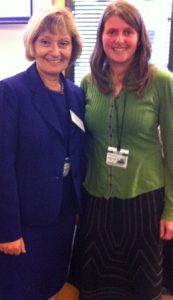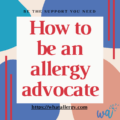Over a hundred people packed into the Attlee Suite at the Houses of Parliament on Wednesday 16th October to hear expert speakers discussing trends in the prevalence of allergic disease and the underlying causes, provision of clinical allergy services and comment on progress made since the House of Lords Science and Technology Committee’s report on the topic in 2007.
The event was organised by the Parliamentary Office of Science and Technology (POST) and The National Allergy Strategy Group (NASG) and was chaired by Baroness Findlay of Llandaff, Member of the Lords and Vice-Chair of the All Party Paliamentary Group for Allergy Chair and Lords Science & Technology Sub-Committee on Allergy (2006-7)
The NASG organises these All Party for Allergy group meetings regularly but it always seems we have the same discussions and face the same issues. Very little headway seems to be made from one meeting to the next. 40% of children in the UK having some kind of allergy and that figure is rising yet there are only 35 specialists allergists in the whole country; there clearly still remains a vast unmet need.
Since the the last report on this subject in 2007 have we made any progress and is there any hope for the future for people with allergies?
Presentations included:
Dr Adam Fox, Consultancy Paediatric Allergist at Guys & St Thomas’ Hospitals who shared some fascinating insights into The Allergy Epidemic, what’s happening and where things are going in the future.
He began by going back in time to King Menses, an Eyptian Pharoah who was thought to have died from a wasp sting. Brittanicus, the son of a Roman Emperor was so allergic to horses that the rash he developed would prevent him from seeing where he was going and he couldn’t ride out to war. There were also reports of gladiators developing hives and allergies upon drinking goats milk.
So allergies are not new but they used to be rare. Now they are becoming increasinly common and are turning into a dangerous epidemic.
He talked about three basic reactions.
- The body ignores the food which means a person can tolerate that food and eat it without any problems.
- The body responds to an invading object such as a virus and acts to eradicate and heal a wound. This happens when we have a virus etc.
- And finally, an overreaction, which is what allergies are. The body has an inappropriate reaction to a substance which is otherwise completely harmless and infact often good for the body under normal circumstances. The allergic person’s body fights the allergen causing inflammation, hives and in rare cases anaphylaxis.
He talked about how allergic reactions change over time from eczema in babies and children, to food allergies, rhinitus and then asthma as people reach adulthood. e.g. If you have egg allergy as a child you have a 70% chance of getting asthma as an adult.
And he showed a chart showing the countries with the most allergies. We win that competition. The UK is right at the top followed by New Zealand, Australia, Ireland, Peru, Cost Rica, Brazil and the USA. The list continues but us Brits are far more likely to have allergies than any other nation. Why is this?
Dr Matthew Doyle a GP from Cambridge spoke about his experiences in general practise and explained some of the many reasons why allergy seems to get overlooked and is so poorly understood amongst the majority of GPs, who are the first port of call for allergy patients.
He shared the results of an NASG survey which showed that 74% of GPS felt they didn’t have enough training in allergies. You might think this is the doctors fault but consider how many health conditions they are required to know about from viruses, cancer, heart problems, diabetes, the list is endless. They cannot be experts in all of the illnesses that exist. And despite NICE guidelines and excellent care pathways there can be 10 of these landing on their desk in any one week. Managing this flow of new information and learning it all is a huge and almost impossible task.
He also shared a case history of one of his patients, a 64 year old man who suffered with nasal polyps for over 9 years with a yearly operation to remove them, until Matthew made a connection with a previous diagnosis of aspirin allergy and pinpointed the problem as salycylate allergy. A relatively rare allergy, salycylate is present in aspirin and many foods. Once the patient avoided foods high in salycylate his polyps have not returned.
He said he sees an increasing number of patients who have allergies and also lots who think they have but don’t appear to after testing. These people may have a food intolerance but they don’t get very much help and guidance to discover how to improve their health and so many diagnose their own allergies because they know food makes them feel unwell. This leads to increases in number of people seeking answers from alternative medicine practitioners and cutting out foods without proper advice.
Ruth Holroyd (ME! Eeeek) shared experiences from the front line of what it’s really like living with multiple allergies and how hard it is to find answers. As an adult with allergies there is very little provision for support. So what happens to our serverely allergic population when the NHS discharges them when they reach adulthood? Just as they reach an age where they are most at risk of having a serious anaphylactic attack.
It was not all doom and gloom. It was pretty terrifying. I was on last, after two very well versed and clearly well practised presenters. Heart pumping and mind racing I fumbled about with my props with all eyes on me. Help! But once I had got chatting it was fine. I can talk about me no problem. After all, it’s all always all about me.
My presentation focused not just on the daily challenges and the simple tasks most people take for granted, but which for the person with allergies are a military operation. e.g. shopping, eating out, holidays etc.
I shared how I have to think about the positives and the changes that I’ve been able to make for a healthier future. I want people to see food differently. A life with many allergies does restrict diet but there are still thousands of things out there that I can eat. All fruit and most vegetables – they are all naturally completely freefrom. As is meat if you buy unprocessed varieties. It is very important to understand nutrition though and get advice from a dietician as living with major food groups cut out of you diet could affect your health.
It is a life sentence but it doesn’t have to affect my life in a bad way. There is nothing I can’t do with allergies, well apart from eating a snickers bar perhaps.
It was an brilliant event and if you missed it, all the presentations should be available soon and I’ll post a link as soon as they’ve been published.
It was a taste of what it’s like to be famous. I was completely mobbed afterwards. I couldn’t even get a cup of tea. The questions, interest, encouragement and discussions afterwards were both sad and encouraging.
What people have said…
“I attended the lectures at Attlee Suite. I thought your speech was very well presented and educational” Hiroshi
We are not alone, all fighting to find answers but together we can make a difference.
Allergies are real. They are not a fad, or ‘just in our heads’ or people ‘just being fussy’. Allergies deserve to be taken a lot more seriously. All we want is respect, kindness and a little bit of understanding.















Hey! Well done Ruth!!
A brilliant summary of a very informative day. You came across very well,as was evident by all those queing to speak with you afterwards.
Alison
Hi Alison, thank you, you are very kind. It was so scary but also a brilliant experience. Very glad I did it, and people were all really positive. So is that what it’s like to be famous? I felt quite mobbed afterwards and wouldn’t have had a cup of tea even if a friend hadn’t brought me one. Well done you and Harris too for meeting up with your brilliant MP Cheryl Gillan who is so supportive of the campaign.